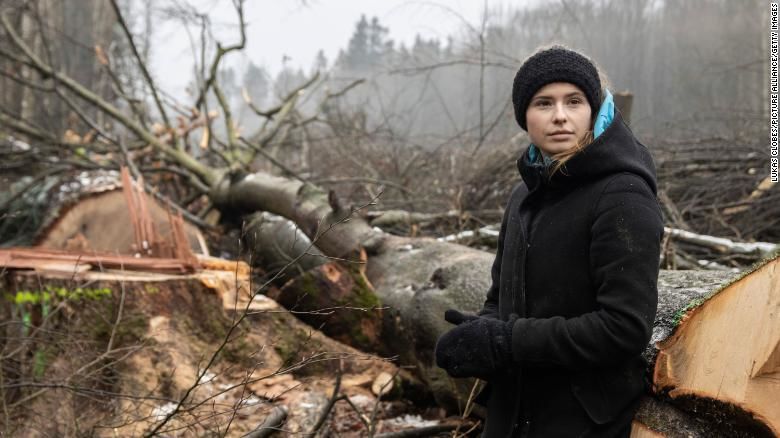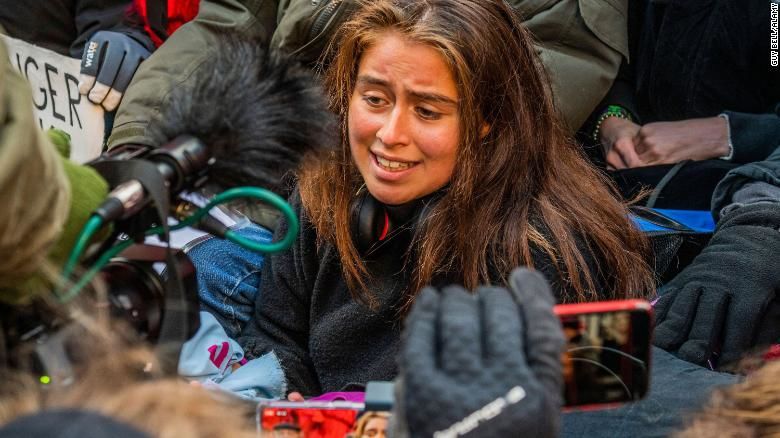
Kids are taking governments to court over climate. And they are starting to win
The 25-year-old climate activist had taken the German government to court last year and won.
On April 29, the country's Supreme Court announced that some provisions of the 2019 climate change act were unconstitutional and "incompatible with fundamental rights," because they lacked a detailed plan for reducing emissions and placed the burden for future climate action on young people.
The court ordered the government to come up with new provisions that "specify in greater detail how the reduction targets for greenhouse gas emissions" by the end of next year. The decision made headlines across the world.
"It was hard to digest, because it was so, so unexpected," Neubauer told CNN, stressing that while it was her name on the case -- Neubauer et al. versus Germany -- she was just one of many people involved.
"This case changes everything," she said. "It's not nice to have climate action, it's our fundamental right that the government protects us from the climate crisis."
Peter Altmaier, the German minister for energy and the economy called the court's finding "significant" and a "historic decision for climate and the rights of young people."
Climate lawsuits are becoming an increasingly popular and powerful tool for climate change activists. A January report released by the United Nations Environment Programme found that the number of climate litigation cases filed around the world nearly doubled between 2017 and 2020.
Crucially, the governments are starting to lose, Neubauer's victory came just months after a court in Paris ruled that France was legally responsible for its failure to meet emission cutting targets.
Another similar case involving six young people from Portugal was fast-tracked at the European Court of Human Rights last October.
Mark Clarke, a partner at the international law firm White & Case, says that not only are there more climate cases being brought forward, there's also a shift in the way they are being framed. "The most significant trend is the pivot away from claims for damages as a result of the physical impacts of climate change, towards rights-based claims," he said.

The cases are most often centered around the idea that future generations have a right to live in a world that is not completely decimated by the climate crisis.
Neubauer and her co-claimants argued that the current German government's failure to have a concrete plan to reduce emissions beyond 2030 would make their lives more difficult because they'd be forced to confront the catastrophic impact of climate change in the future.
The 2019 law called for a 55% reduction in greenhouse gases by 2030 from 1990 levels.
The lawsuit argued that the target wasn't sufficient to meet Germany's obligations under the Paris accord. Under the agreement, most signatories pledged to keep global temperatures below 2 degrees Celsius and as close to 1.5 degrees above pre-industrial levels.
The Intergovernmental Panel on Climate Change (IPCC) has said that warming of more than 2 degrees would have devastating consequences, including sea level rise, frequent heatwaves, extreme weather and droughts.
"The [German Constitutional] court was not so much talking about the impacts of climate change on young people, but the impact of mitigation measures," said Gerry Liston, the head of climate litigation at Global Legal Action Network, or GLAN.
"If action is delayed, it will require vastly greater emissions reductions in the future and that would impose a massive burden on those alive then," he said.
Liston is representing the six Portuguese young people who have taken 33 governments to the European Court of Human Rights over their failure to act on the climate crisis. Aged between nine and 22, they are already experiencing its effects. Four of them are from Leiria, a region devastated by deadly wildfires in 2017. The fires killed at least 62 people -- some of them burned alive in their cars as they tried to escape.
Joana Setzer, a fellow at the London School of Economics' Grantham Research Institute on Climate Change and the Environment, said the fact that so many of the climate cases are brought by young people makes them more powerful -- because children and young adults can legitimately argue they will face the worst impacts of the climate crisis in the future.
"These kids, they found their voice, they went to the streets and they were there, shouting in front of parliaments, and when they couldn't go to the streets anymore because of social distancing and Covid, they went to court," she told CNN.
Governments around the world have been coming up with ever more ambitious climate targets in recent years. But according to UN climate chief Patricia Espinosa, many have so far failed to set out plans on how to reach them. Now, they are being held accountable for their promises.
"The government seems to still mix up setting climate targets with doing climate action," Neubauer said. "It's two different things -- targets cannot replace what the government does now, and what the government does right now is basically preventing us from reaching those targets."
The new tobacco
Setzer told CNN that while a majority of climate cases are still either unsuccessful or pending, there have been some significant wins in recent years. The UN report on climate litigation also said there has been an increase in the success of actions taken.
Tim Crosland, the director of Plan B, a charity focused on climate litigation, said that when it comes to lawsuits, climate is the new tobacco.
"In the tobacco litigation cases, you had quite few successful cases to begin with, before the tide turned and the litigation started to go the other way," he said. Crosland said the trend in climate cases began to emerge in 2018, when three key events helped shift the public perception of the scale and urgency of the crisis.
"You have the IPCC report when we get the headlines around the world that say we have 11 years to save the planet; you have Greta and her school strikes, and you have the extinction rebellion protests," he said, referring to the Swedish activist Greta Thunberg.
"This culminates in a number of things, including this trend of governments declaring climate emergencies and it becomes really hard for the courts to ignore."
Clarke, the White & Case lawyer, added that legal precedent is building as the number of cases rises. Advances in climate science are also helping, he said.
"[That] is enabling claimants to address the challenges they have previously faced with respect to establishing causation and the apportionment of liability."
Yet for many activists, winning isn't even the ultimate goal, Setzer noted. "They are really understanding the strategic role of litigation and making the process as -- or more -- important than the outcome. These cases receive so much media attention and this is becoming something of a real concern for governments," she said.
'We can't sit by and watch this'
As one of the faces of the climate movement in Germany, Neubauer says she is on the receiving end of lots of backlash -- she even jokes that she gets death threats at the same rate as postcards from her grandfather.
"It's incredible how much aggression arises once people take action ... but it's not my problem. If [some people] decide to spend an afternoon writing hate messages about me on their Facebook wall, that is their problem and not my problem. That's their hate."
She said the lawsuit was just a logical continuation of the climate protests she helped to organize across Germany. "We found out that we had been striking for 125 weeks and the government was somewhat resistant to the idea that it might be actually their job to protect our future through the action today, and so I felt we need to do everything possible to change the course of things."
It's a sentiment echoed by Marina Tricks and Adetola Onamade, two British students who have launched their own legal action together with Plan B against the UK government over what they say is a "failure to take practical and effective measures to meet its legally binding targets for reducing its domestic greenhouse gas emissions."
"The government is saying we are climate leaders and we are setting an example, but then they are putting £27 billion into roads, and a few million into the green recovery deal and they are completely ignoring the global dimension," Onamade said.
"We can't sit by and watch that happen -- we will hold them accountable in court, but we will also hold them accountable on the streets," Tricks added.
In response to the lawsuit, the UK government said the claim was "totally without merit" and that the assertion that the government was failing on climate policy is "manifestly false."

Along with their co-claimant Jerry Amokwandoh, Onamade and Tricks say that they have families and friends in West Africa, the Caribbean and Latin America, parts of the world that have been hit hard by the climate crisis.
They allege the UK government's support of fossil fuels and the lack of meaningful climate action violates their human rights, including their right to family life, according to the claim for judicial review filed with the court.
"The UN has put out estimates that there could be 200 million, and up to 1 billion, [climate] migrants by 2050, and we know these facts, yet we're still on the same trajectory," Tricks said. "It's the fact that the government is seeing these facts -- because I know that if I'm seeing them, they're definitely seeing them -- so they have the full knowledge, they have the means, they have the solutions, yet they're doing nothing."
Over in Germany, it took the government less than a week to come up with new climate goals following its defeat at the Supreme Court. It is now proposing to cut its carbon emissions by 65% from 1990 levels by 2030, as opposed to the original 55%. It also pushed forward its net zero target, from 2050 to 2045. The law will need to be approved by the German parliament.
Neubauer remains unimpressed. "I wonder if they've actually understood what the court has ruled there," she said, saying that adding a couple of percentage points here and there simply doesn't cut it.
"We need to think the other way around. There is a clear boundary -- the amount of emissions, the carbon budget that we have, is finite. You cannot extend it any longer and we need to think from that budget backwards, what does it mean for the amount of emissions we can produce today and tomorrow," she said.










